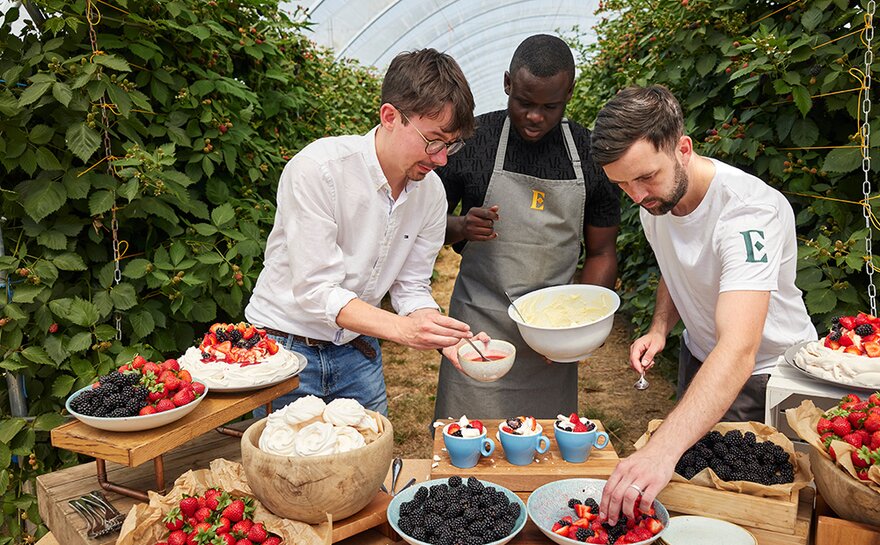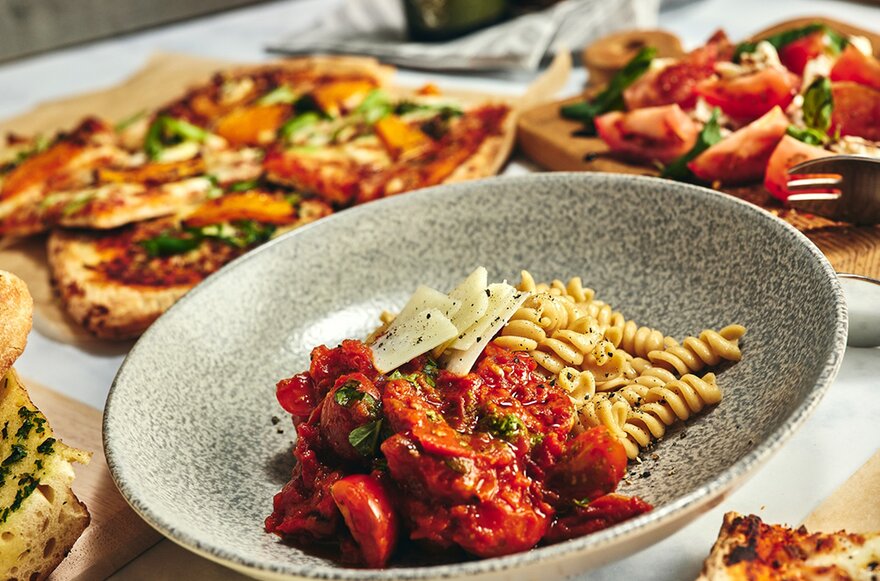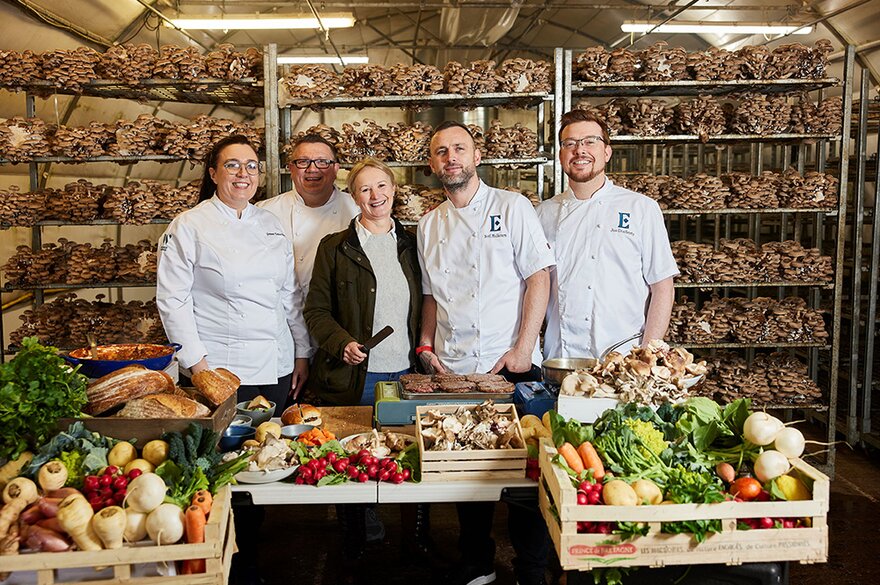The managing director of Eurest is behind the introduction of carbon labelling on meals, raising awareness not only among diners, but chefs too.
How has Eurest repositioned since 2021?
When I came back to Eurest in 2017 and took on the role of managing director, we were losing sight of what our purpose was from a food standpoint. Our purpose that we're anchored on now is to make people just that little bit happier in the workplace every day.
We're also focused on the fact that food is not just about fuel. Pre-Covid, that was more the view in general about workplace feeding, but post-Covid there's a realisation that F&B gives people a reason to get together, socialise, collaborate and to attract them back into the workplace. It is a fundamental tool in a labour market where it has been very tough to attract and retain great employees.
We know from our Global Eating at Work survey [a report undertaken by Compass this year which aimed to show how employers can increase staff productivity and wellbeing] that, where there's an F&B facility in the workplace, it's seen as the number two benefit after flexible working. We've worked hard to support both our consumers and clients with changing trends post-Covid.
What have been the main achievements in the business in the past 12 months?
I have a strapline: we have a duty to nudge the nation. This means we can help people over time make the right choices for the planet and for future generations. Fifty-three per cent of our menu is plant-based, we've reduced the meat in our top 12 meals by 40% and, just in the last year, we've taken 600,000kg of CO2 out of our emissions.
Alongside that, our food offer has come on in leaps and bounds. I love it to bits. I think it's those things that are winning us business and it's all done with integrity because we have proof points and evidence.
We're seeing 10% net growth every year and we won £23m of new business last year. The growth is also good for the team because it creates careers, which is super-important.
That's significant growth. Was that your best year to date for new contract wins?
We've done quite well for a few years in a row. The business and industry sector of Compass has grown substantially in the last year – by 10% – and I anticipate double-digit percentage growth in the financial year ahead. We've won a couple of large clients this year – Harwell Science and Innovation Campus [in Oxfordshire] and the Westworks [an office working space in west London], so I expect to continue to grow further.
Pre-Covid, we had 20% fewer contracts than we do now. We currently stand at a good size with about 320 sites and more than 100 contracts, serving up to six million meals a year.
Tell us more about Eurest's work with nutritionists and scientists at Oxford University
At the start of the pandemic we hooked up with Oxford University around how we could nudge consumers to choose more sustainable meals. We launched the Livestock, Environment and People (LEAP) labelling project, which colour-codes dishes from A to E, where A is more sustainable and E is the least – a bit like the calorie labelling we all recognise.
We trialled this at 15 client sites that remained operational throughout the pandemic and saw success in informing consumer nudges, but also empowering our chefs to reformulate recipes with the data. We then rolled it out across our B&I portfolio in late 2021. We have now switched to Foodsteps carbon labelling, which will be used across Compass Group UK & Ireland.
What difference has it made?
It is so important to nudge people's behaviour. You can't tell consumers they can't have certain things, rather you've got to try and get them to choose the right things.
The other bit of science that comes with it is the different nudging techniques. If you work hard at making your plant-forward food look beautiful on the counters, people are drawn to it. If you put your plant-forward food at the front of the counter, it'll be the first thing customers see and they're more likely to choose it.
When you changed the food strategy, what did you do to secure buy-in from the wider Eurest team? Did it take a change of mindset from your chefs?
Our chefs and teams have been surprised at the fact that some dishes were LEAP labelled as red, so there was an education piece there. We also had meetings where we talked about carbon emissions. There is a lot of focus on aviation, but the reality is 10% of carbon emissions are created by global food waste and only 2% are created by aviation.
Sharing some of those statistics made the chefs think: "OK, I need to sort food waste and we need to move away from the red LEAP labelling." People began to feel they had a duty not to have red labels on their menus, so they started to nudge towards ambers and yellows.
What I've learned in my time is that people are motivated by different purposes, duties and benefits. Some people in our team will reduce food waste to save costs for clients and for the business, but some see it as our duty to reduce carbon emissions for the planet and for future generations, and that's a real motivator.
Do you still see the high street as competition or does flexible working discourage employees from leaving the building now?
What we've found over the past year is an improvement in terms of how our consumers are seeing value in the workplace. Consumers on the high street have seen significant price increases, whereas in the workplace there's a realisation that it can deliver really great value. Where else can you get a main course for under a fiver that is a proper, nutritious meal? It might be a plant-forward meal or it might be chicken and some nice vegetables. We have seen an increase in that value recognition from consumers and that's what differentiates us from the high street.
How flexible are the clients you work with now? Are they expecting their employees in the workplace more?
We have quite a lot of manufacturing clients who were at work during the pandemic, but from an office point of view, we're definitely seeing a return. Mondays and Fridays have been slower to recover, but spend on busy midweek days is higher as customers are tending to treat themselves more when they are in the workplace.
I think this return is for two reasons: employees see the benefit of having people together, face-to-face, but there is also a creeping fear of missing out, where people are thinking, if I'm not in the office, there might be cool stuff going on or discussions that I don't want to miss out on.
Does food now play a bigger part in the working day?
We're finding that our facilities are being used more in break-times or for casual meetings over coffee or over a snack. It's inevitable that the use of the dining and facilities will drive an element of incremental sales, but that's one aspect; F&B is really being stretched in terms of what value it brings to the office and how it can bring people together.
Clients are clearly interested in the wellness and supplying nutritional meals. How do you signpost people to make the healthier choice?
Consumers are telling us through feedback they want more choice and that's how we increase sales participation. People who want healthy food will only use your facility if they get what they want. Employees who go to the gym in the morning and then come into work are going to want something that complements the exercise they've just done, so that's important to take on board. Some of our clients will also subsidise healthy options; one, JLR, is subsiding our ‘Good Stuff' range to support healthy eating among its staff. As a result, we have seen up to 40% increase in uptake of healthy meals.
There have been some new entrants into the B&I market in the past year. Do you still come up against the same names when tendering or is there a noticeable change?
There are some long-standing, respected businesses out there that we're all familiar with and we compete with each other. There are a few new start-ups too, but they tend to be a little bit more niche, but we've all got our part to play. We're understanding from employers that F&B plays a fundamental part in attracting and retaining employees, more so than ever, so we're seeing more clients wanting to open up new facilities where they didn't have them before, or they are investing in facilities because they want to have different uses out of the F&B space, so that's making it quite a busy market.
You are vocal about your commitment to sustainability – what checks do you do with your suppliers to ensure their commitment matches yours?
We have made a commitment on scopes one, two and three [the three scopes are part of the Greenhouse Gas Protocol, the main global standard for public and private sector entities to measure emissions]. It is unusual for businesses in our industry to commit to scope three because that is a huge percentage of our total carbon emissions. The foodbuy team work very closely with our suppliers to make sure they're on the same journey.
We've done some great work on scope one and two, so most of our fleet is electric and 84% of the food we buy is produced in the UK. We really focus on seasonal produce and we have a ban on air freight for fresh goods. We have to work hard with our suppliers to make sure we're achieving all of those and that they are also reducing their carbon footprint, because they have to do that for us to achieve net zero.
You've done a lot of work on waste, but is there still more to do?
We've reduced our food waste 19% year-on-year. We know that because we measure it on a daily and weekly basis, but there's always more we can do. We are aiming to reduce food waste by a further 30% in the next 18 months and that involves understanding what products we're wasting and planning accordingly.
Morag Freathy on winning awards
Freathy won the Foodservice Caterer Award at the 2023 Cateys and, although she says she was "hugely humbled and flattered", she credits the team for the recognition.
"Eurest has come on an interesting journey, from lacking a purpose and direction and not delivering as good a job as we could have to where we are today," she says. "The Cateys are all verified by proof points and that's a reflection of the journey Eurest has been on."
In total, the Eurest business won four Foodservice Cateys in 2023, further reinforcing the development of the division.
"It's always lovely to win an award – it's so motivating," Freathy adds. "We've won a number of Cateys for individuals who make a fantastic contribution to the business every day, such as Gemma Evans-Hurley [culinary lead at Eurest, who won Chef of the Year at the Foodservice Cateys 2023], who is doing a great job.
"The important thing is they set the example for everybody else in the business. People look up to them, and that's important for our culture. Yes, we do a good job, but we can always do better."
Morag Freathy's CV
May 2019-present Managing director, business and industry, Compass Group UK & Ireland
October 2017-present Managing director, Eurest UK, Compass Group UK & Ireland
October 2016-August 2017 Managing director, Chimichanga restaurant brand, part of Prezzo
May 2013-September 2016 Managing director, growth markets, Compass Group UK & Ireland
December 2010-April 2013 Strategic retention director, Compass Group UK & Ireland
October 2007-January 2011 Deputy divisional director, Aramark
January 2002-October 2007 Operations director north and Scotland, Pizza Hut UK
1995-2002 Regional sales manager, Beefeater Restaurants
Continue reading
You need to be a premium member to view this. Subscribe from just 99p per week.
Already subscribed? Log In







